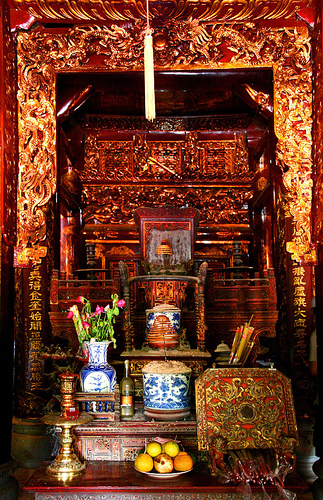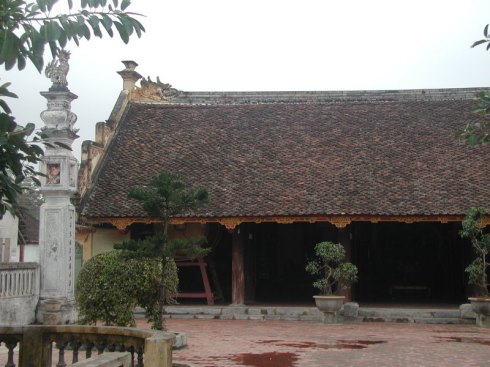On a recent holiday here, my friend and I went to visit his teacher Ong Muoi (known as “tenth uncle” in earlier posts here), who has moved from the island of Phu Quoc in South China Sea to the land of his ancestors about 90 minutes away from Saigon in Binh Duong town. Ong Muoi came to Binh Duong to build a “định” on his family’s land, and my friend Hai had been suggesting that we go see it.

Altar at the Village Định: More deities than you can shake a joss stick at.
As far as I can tell, a định is a cross between a place to pay homage to the village’s deceased leaders (like a monument or memorial but with an altar), a place to worhsip animist deities like the “water god” and the “mountain god,” a place of gathering for the villagers to meet each other (village square), and in some cases, a place of religious worship (Buddhist). Because Ong Muoi follows the Buddha’s teachings, he included a buddhist shrine at the định. Whatever the object of veneration, the ritual seems the same: people appear from the village, light joss sticks, place them against their forehead, bow three times, insert them into the incense burner and then start talking to each other. [Sadly the photos of Ong Muoi and his new dinh, which were taken with my trusty cell phone cam, disapeared with the trusty cell phone cam on the streets of Saigon. ]
It should be noted that the 88-year old Ong Muoi built the dinh himself (my last post said he was 82 – I was six years off). And because he is a doctor of traditional Vietnamese medicine, he also set up a small herbal medicine clinic on the site as well, with about 84 newly-built bins filled with local herbs. Not bad for someone his age – or my age for that matter. He said he came back here for the end of his life, because it was where his family is from, and because his relatives were planning on selling the land (or stealing it, I could not tell which).
We sat and talked for a few hours, and it was quite rewarding to finally be able to understand enough Vietnamese to speak with him directly. We would talk about the trip Hai is planning – to take Ong Muoi to Bodh Gaya, the place of the Buddha’s enlightenment – and then rest a bit. Then we talked about the dragon fruit that Hai and I had brought and we were eating – still not ripe, he said, disapprovingly. He would ask about my breathing, and whether I had taken his advice offered at Diamond Bay, and we would drink some tea, and rest some more. And then he would ask about my dreams. What kinds of dreams was I having? Where they peaceful or disturbing? He would ponder my answes, and often say nothing. He has a kind of non-invasive benevolent presence that is so nice to be around.
And as we sat and talked, night came to the place, and people emerged from the countryside, and the dinh started to come to life. People come there to pray, ring a bell, light incense, chant prayers, or just sit there in the placid way of the locals, squatting on their haunches, talking, sharing or just being silent. Most of them are elderly women, and I am reminded again what I love about this country. Of course there is fascination with a foreigner (me) that can make one self-conscious, but underneath that, there is this intense affection in their faces that one would take the time to come to this place and be with them: it is in their touch, in their words, in their a playfulness and in a kind of encouraging presence that says “whatever journey you may be on, I wish you well.”
Ong Muoi in his understated way pretends to be too busy to engage with the visitors – “his people” – who kind of come up to him, and tease him, tug at him, poke at him. He laughs and smiles, and scurries along, in perpetual motion when out in public. When a middle aged man brings his youg four-year old daughter to the định, she comes running to see Ong Muoi, who scoops up the shy girl and brings her to sit and talk with us.

A Village Định
Down to Business.
Ong Muoi always like to talk about Buddhist things. Do I believe in reincarnation. What kind of reincarnation? Did I know how to relieve the sufferings of samsara? Was I repeating the name of the Buddha? And I would ask him things as well. I asked why when I live in Saigon does my energy dissipate so much, and he said because I think about everything too much. (Buddhism for beginners.) He mentioned all of the wild dakinis who tempted the buddha prior to his final enlightenment.
But my favorite story from yesterday was the following: He explained to me the legend that one way Buddhist masters in the old days would check their students progress is that they put them in a big pond filled with crocodiles. According to Ong Muoi, those who had realized the Buddha way would float because they had digested their karma, and those who hadn’t would sink due to the weight of their undigested karma. I think today we would call that “up or out,” and is one reason I have a hard time keeping my head above water in crocodile ponds (such as Saigon!)
The hour grew late, and Hai and I had to head back to the city. We stopped to eat “bun bi” a delicious noodle, vegetable, chicken combination, and drove 90 minutes through the dark, weaving amidst cars and motorbikes, heading back to the belly of the beast, Saigon. There, we would no doubt be crocodile food in no time.


Leave a comment
Comments feed for this article